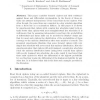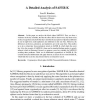13 search results - page 1 / 3 » Key-Schedule Cryptanalysis of DEAL |
SACRYPT
1999
Springer
13 years 9 months ago
1999
Springer
DEAL is a six- or eight-round Luby-Rackoff cipher that uses DES as its round function, with allowed key lengths of 128, 192, and 256 bits. In this paper, we discuss two new result...
ESORICS
2004
Springer
13 years 10 months ago
2004
Springer
This paper considers iterated ciphers and their resistance against linear and differential cryptanalysis. In the theory of these attacks one assumes independence of the round keys...
ICISC
2001
13 years 6 months ago
2001
Although many strong cryptanalytic tools exploit weaknesses in the data-randomizinig part of a block cipher, relatively few general tools for cryptanalyzing on the other part, the ...
JOC
2000
13 years 4 months ago
2000
In this paper we analyze the block cipher SAFER K. First, we show a weakness in the key schedule, that has the effect that for almost every key there exists on the average three an...
FSE
2000
Springer
13 years 8 months ago
2000
Springer
We improve the best attack on Rijndael reduced to 6 rounds from complexity 272 to 244 . We also present the first known attacks on 7- and 8-round Rijndael. The attacks on 8-round R...


